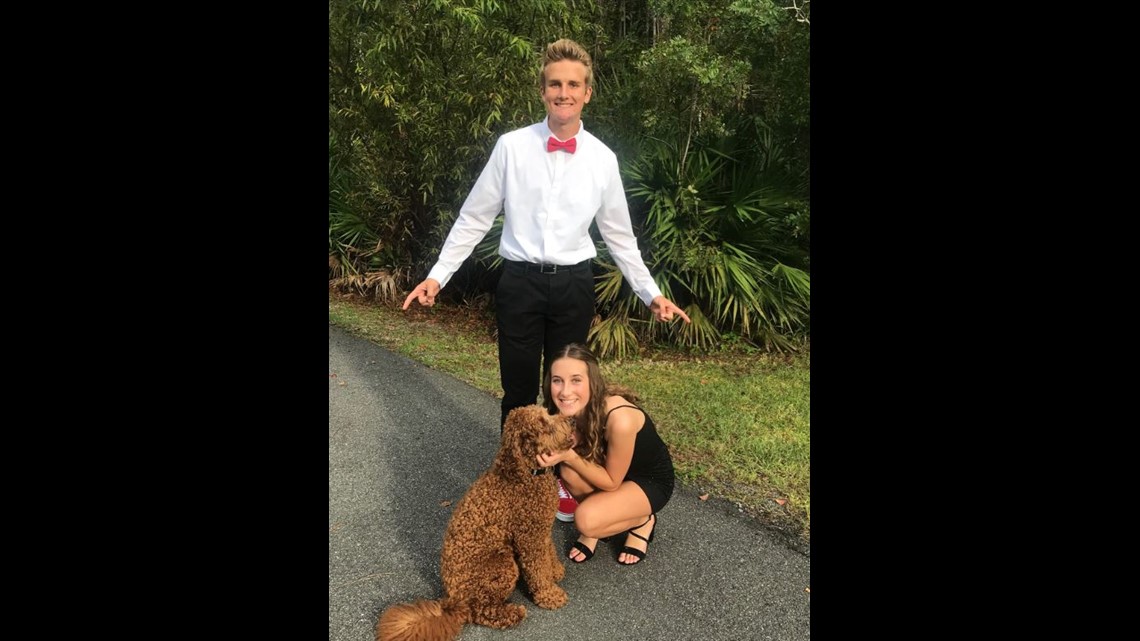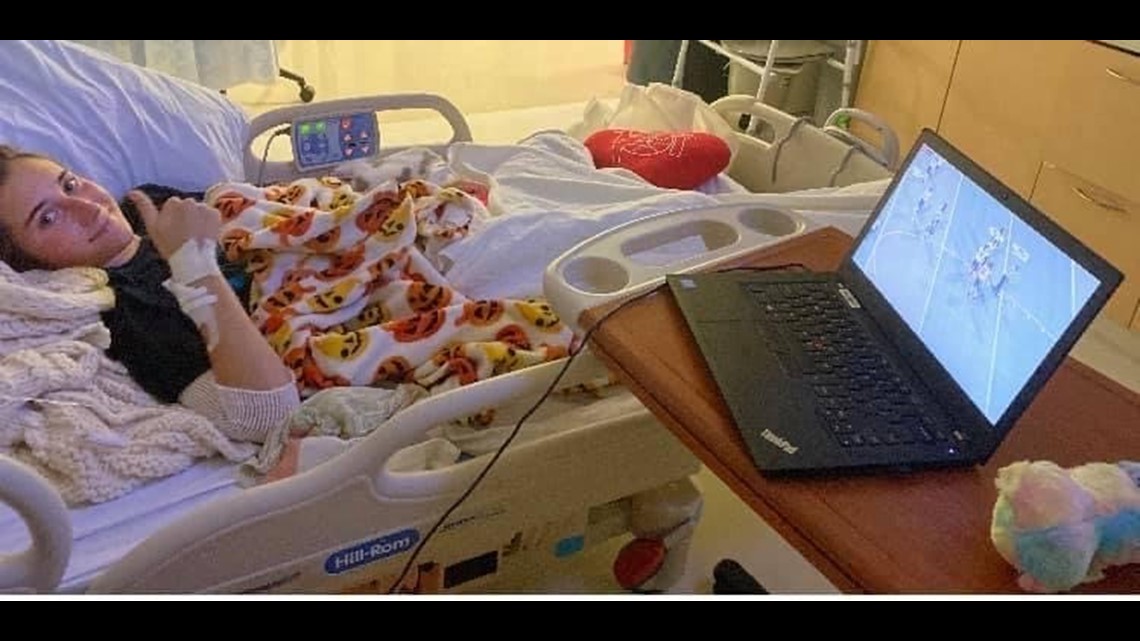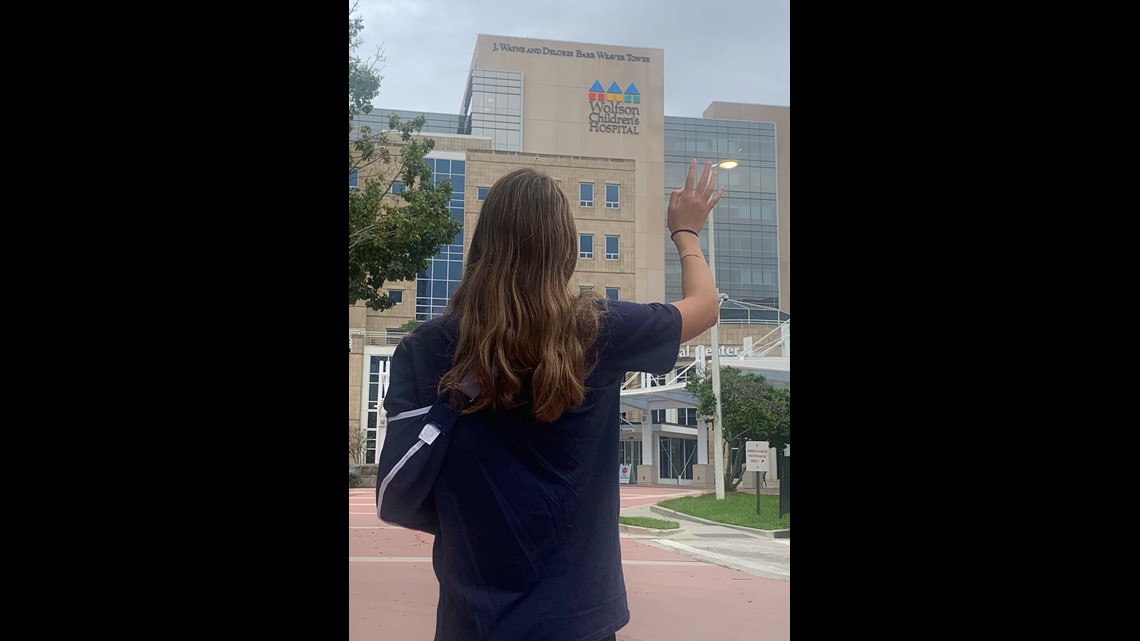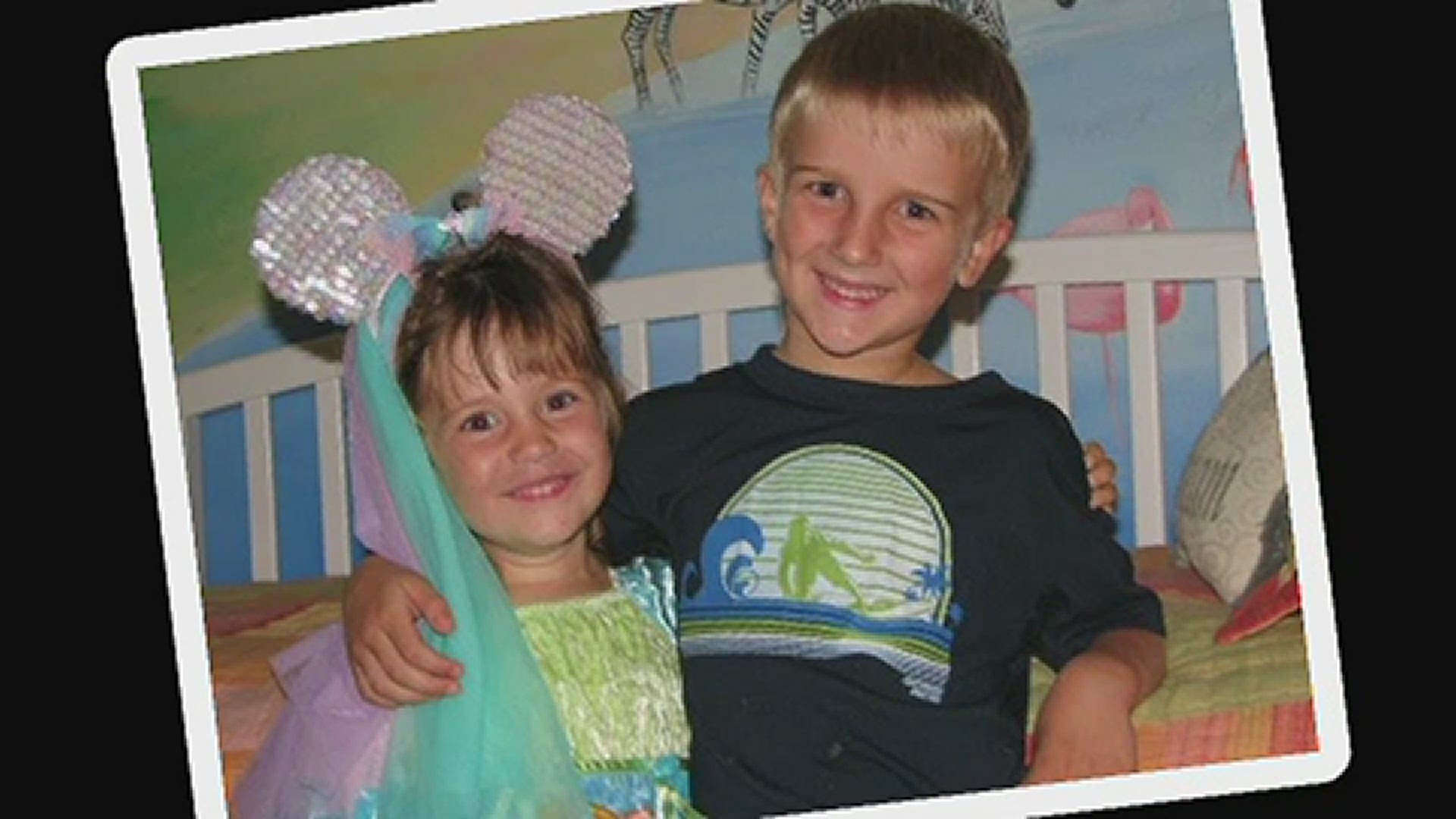Matthew and Julia Bosset are your typical brother-sister duo.
“We obviously fight a lot like all brothers and sisters do. We get into it sometimes about stupid stuff,” Matthew, a senior at Seabreeze High School in Daytona Beach, laughed. “But in the end… we’re always with each other.”
Matthew is the captain of the football team. Julia, a sophomore, is the captain of the cheerleading team. He drives her to school every day. They’re never too far apart.
“All we had was each other growing up. I’m only a few feet away from her every day,” Matthew continued.
“Except this last week.”


- - - - - -
October 13 was like any other Tuesday. Matthew and Julia went to school. The bell rang, and they both dashed off to their extra-curricular activities. For Julia, October 13 meant basketball try-outs.
“I was out at football practice, and two of [Julia’s] friends came running outside crying and they're like, ‘Julia took a nasty fall,’” Matthew recalled. “I'm walking in there assuming that, you know, she might have broken something or like she busted her knee open or whatever.
“And I opened the door to go in the gym. And the first thing I see is her getting CPR, [and] them pushing into her chest. And then probably 10 seconds later, they administer a shock with the [AED] pads on her. So, first 15 seconds walking into the gym, I'm just in utter shock.”
Julia’s heart had stopped beating. She was taken to nearby Halifax Hospital. Her parents would beat the ambulance to the Hospital.
“It was much worse than we were prepared for,” Jeff Bosset explained. “At that point, we were finding out fairly quickly that it was obviously a heart condition or something. Her heart had gone into fibrillation. So, we knew that there was a cardiac episode, but we assumed that it was tied to what we knew she had.”
Julia did have a pre-existing heart condition: she was diagnosed with mitral valve prolapse with regurgitation when she was in the third grade. But she had just had her annual cardiologist appointment, and doctors said the worst the Bosset’s could expect would be a possible mitral valve replacement much later in Julia’s life. She was cleared to play sports.
Because she was already a patient at Wolfson Children’s Specialty Center in Daytona, the decision was made to airlift Julia to the main campus in Jacksonville.
“The two paramedics that were on that chopper were amazing, amazing people. They came in and kind of took over from that point,” Jeff said. “The difference was: we had to drive so we're an hour and a half away. So, we had to drive an hour and a half with the thought and fear of what condition our daughter is in.”
Upon arrival, the Bosset’s found Julia in stable condition, with the staff at Wolfson already creating a “plan” for her recovery. But one of her parents’ biggest concerns still remained.
“We were still completely unaware if there might have been any brain damage due to lack of oxygen,” Jeff said. “Our fear was that maybe she would not be the same person.”
It was a concern of the staff at Wolfson, too.
“Julia sustained a cardiac arrest due to an arrhythmia. And when that happens he heart basically stops pumping. And when the heart stops pumping, there’s no oxygen going to the brain and seconds matter. Fractions of seconds matter,” Dr. Sunita Ferns, electrophysiologist at Wolfson and UF Health explained. “Immediate CPR is the only thing that can determine good neurological recovery.”
Time was on Julia’s side: the school resource officer who had administered CPR did so within 20 seconds of her collapse. It proved to be a game-changer: MRIs revealed no damage to Julia’s brain. The worst had not come to fruition.
“If it had been another 10-15 seconds, she could’ve possibly had neurological consequences secondary to the arrest,” Ferns said.
“Because of the officer at Seabreeze -- she saved her life,” Lori, Julia’s mother, reflected. “And I can't stop thinking about if this happened somewhere else. If it happened at home, or she went for a jog in the neighborhood, and something happened, she's on the side of the road, and I wouldn't even know it. So if it had to happen to happen, it did at the perfect place. The right place at the right time.”
But there was still the bigger question: what spurred Julia’s cardiac episode?
“A lot of times, sudden arrest in young people will come out of the blue. They’ve had absolutely no symptoms,” Dr. Ferns explained. “Most commonly, it’s a cardio myopathy or a genetic arrhythmia syndrome. Julia did have a common enough condition in young people – mitral valve prolapse. These are often times benign. 99.9% of the time, you’re not going to have a problem with mitral valve prolapse. However, a very small subset of patients with mitral valve prolapse could go on to have arrhythmias. That’s part of the on-going work on Julia’s case: was this arrest caused by a new arrhythmia syndrome or was this part of her pre-existing heart valve problem?”
While research and review continues, Julia was diagnosed with Long QT Syndrome, a genetic heart rhythm disorder. Surgery to insert a defibrillator took place shortly thereafter. Julia will now have it for the rest of her life.
Still heavily sedated but in stable condition, Julia began to recover. Progress continued to be made: Lori noted that “the moment Julia asked for her phone,” her parents knew she was back to her normal self.
Matthew was back, too. Back on the football field, gearing up for Homecoming on Friday night.
Well, after sitting on a park bench outside Wolfson Children’s Hospital into the night on Tuesday.
- - - - -
Seabreeze’s game against New Smyrna Beach that Friday night was dubbed a “white out.” But it also featured a smattering of blue: new shirts featuring the rally cry “For Julia” that had been born in the days since Julia’s cardiac episode. Signs and posters dotted the socially distant crowd with the same message.
All of this on top of what was already scheduled as a Homecoming celebration – with Matthew front and center.
“I was up for homecoming court. So halftime comes around,” he recalled, “they do the crowning of the king and queen, and me and my friend were [nominated.] And, you know, they announced that we both won it.”
On the field, Matthew had already started off the game strong with two catches on the opening drive – roughly around his season average. But the good juju from the halftime ceremony carried over immediately to the first drive of the second half.
“First drive of the second half, we marched down the field, and I probably get the ball five times and then cap off the drive with a touchdown. I don’t think you could’ve written it up any better.”
“Julia and I were actually watching the game,” Lori said. With Julia’s condition improving, Jeff had made the trip back down to Daytona Stadium. “We were streaming it on Facebook Live. So I was while she was watching some she was still at that point, still very tired. But I think the whole floor could hear me screaming when he got a touchdown. And when he got homecoming king, so probably not a good thing to do on a cardiac floor!”


Seabreeze went onto win 27-10, avenging last year's playoff loss to New Smyrna. But the celebration didn’t stop when the final whistle blew.
“My head coach, Pat Brown, played at Rutgers with Devin and Jason McCourty, who are starters for the New England Patriots – which is our family’s favorite team,” Matthew said. “We’re on the players bus back, and I get a group message with me, my mom [and Brown]. It’s two images that I couldn’t load because I have low storage or whatever on my phone. So then I click on it, and it’s Jason McCourty, right in front of me. And I'm like, ‘No way! What is this?’ and I swipe to the right, and it's Devin McCourty, congratulating me on the touchdown. So those videos only had to be a few minutes old. That was really cool to me. I mean, that's probably that was probably one of the coolest moments of my young life so far.”
The McCourty’s weren’t the only ones reaching out to the Bosset’s. A GoFundMe was started to assist with medical bills. On Sunday, when Julia was able to move from her hospital bed, her cheerleading team drove up from Daytona and stood outside Wolfson Children’s Hospital to wave. The staff was able to get Julia safely onto a patio so she could see and talk to her teammates, who performed a special cheer for her.
“It doesn't really get any better than that,” Jeff smiled. “Once you are starting to see a positive outcome on the health condition, then the rest of it is just kind of icing on the cake.
“It also sounds like we're gonna probably have to get a better phone for Matthew with more memory, more data."
- - - - -
Julia was discharged from Wolfson less than ten days after her heart stopped beating. She made it home in time for Matthew's 18th birthday on October 23. She's back to living a couple feet away from her brother.
“All that's happened in the past week has just been crazy,” Matthew reflected.
The Bosset’s are grateful for the support of their community and the team at Wolfson – noting that, although they hope it’s not under the same circumstances, they will definitely be back to visit the team at Wolfson. Moreover, they’re eager to share the lessons they’ve learned.
Number one: the importance of heart screenings.
“The regular sports physical doesn't cover this electrical part of the heart. I mean, they do regular testing, but not this in depth,” Lori said. “And I feel like there's a lot of kids out there that could have this that may not be diagnosed yet.”
Dr. Ferns agrees, noting that in Europe, EKG testing is “common standard” in young people. But it is not widely adopted in the United States.
Moreover, given that Julia’s arrhythmia is considered genetic, the entire family will now be tested for Long QT Syndrome. Dr. Ferns notes that that specific testing is nothing to get worked up about: after 15-plus years of research, doctors have boiled it down to a simple cheek swab.
“We're learning so much more about this. That, really, anybody who has a child who's in sports of any kind, should be screened. Until this happens, some people just don’t know --which is not the way you want to get tested and find out,” Jeff explained. “We feel like we would encourage any family that has children that are in sports -- whether they know that this is in their family or not – to have that type of testing done just kind of as part of the protocol, before they go out on to do whatever they're going to do. Because it could save somebody's life.”
CPR was also critical in saving Julia’s life.
“CPR and AED’s help save lives. In Florida, I was kind of distraught to hear there’s been a lot of push back about pre-school’s having AED’s available. I think any facility that takes care of children – or adults for that matter – really ought to have an AED that’s accessible,” Dr. Ferns said. She also believes life saving practices like CPR and swimming should be required learning for young people.
Lori Bosset echoes that same message.
“I would like every kid and parent to be trained in CPR, and feel comfortable -- not only just trained -- but confident if something ever happened. They could save their best friend's life. Or they could save their grandparent’s life.”
Matthew Bosset has been CPR certified through the Medical Academy at Seabreeze. Never did he think his first real-life encounter would be with his sister. But now, he and his family are ready to share their story in hopes of teaching others.
“We definitely made the right decision that day when you know when they were airlifted when she was airlifted from Halifax to Wilson,” Jeff said. “It was the right care for her, and we're gonna bring our daughter home.”



